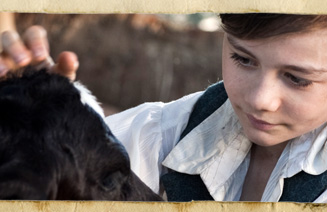In this clip, Mrs Owen is able to detect that Sarah is not a lady based upon her conduct and manners. She notes that if Sarah had been a lady, she would have known that the polite way of expressing thanks was to say 'Thank you ever so!'.
In the world of 18th century England that Mrs Owen comes from, manners and behaviour are important indicators of a person's place within society. The rise of an aspiring middle class led to the growth of a body of books which aimed to instruct the reader on conduct in polite society, and how to recognise class distinctions based upon behaviour.
Discover
- Ask students to research the rules of etiquette of the 18th and 19th centuries in England. Students can find information in the school or local library, or online. As a starting point, refer to the resources listed below:
-
The Norton Anthology of English Literature, 'The Restoration and the Eighteenth Century: Topics', A Day in Eighteenth-Century London, www.wwnorton.com/college/english/nael/18century/topic_1/behave.htm/
-
18th Century Notebook, '18th Century Books and Essays on Etiquette', www.larsdatter.com/18c/etiquette.html/
-
Center for History, 'Introduction to 19th Century Etiquette', www.centerforhistory.org/pdfdoc/male%20and%20female%20etiqu%208.pdf
- In small groups, ask students to find 10 rules of etiquette from the 18th and 19th centuries in England. They are also to decide which rules they think should still be followed today.
Reflect
- Organise a tea party for the students in which they pretend to be ladies and gentlemen of the early 19th century in Australia. Each student is to take on a character and pretend to adhere to the rules of etiquette for the times. Some examples for behaviour might be:
- ladies will curtsey
- gentlemen will bow
- ladies will sit while the gentlemen stand
- ladies will pour the tea while the gentlemen assist with carrying heavy equipment
- ladies will not speak until the gentlemen have spoken first.
- Ask students to dress up in character if they wish, or play different parts such as convicts and servants, as well as children and teenagers.
Download
Student Activity Sheet H20.5: Etiquette



![Fencing [Episode 20 | 1818 : Charles] Fencing [Episode 20 | 1818 : Charles]](/assets/interface/images/spec_graphic/clip/1818/1/thumb.jpg)
![The convict [Episode 20 | 1818 : Charles] The convict [Episode 20 | 1818 : Charles]](/assets/interface/images/spec_graphic/clip/1818/2/thumb.jpg)
![Being a lady [Episode 20 | 1818 : Charles] Being a lady [Episode 20 | 1818 : Charles]](/assets/interface/images/spec_graphic/clip/1818/3/thumb.jpg)
